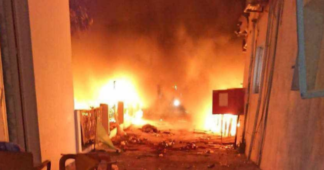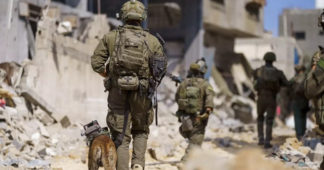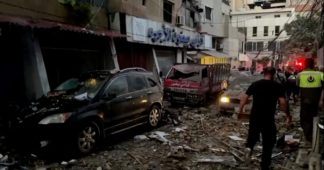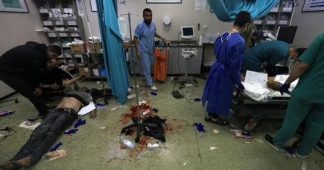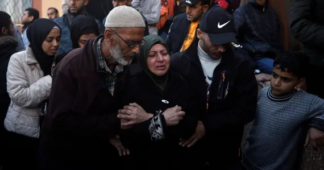by Evan Hill
Oct 22 2024
On Friday, 21-year-old northern Gaza journalist Wafaa Thaher was staying in the home of her family’s landlord, her own having been destroyed, when an explosion from an airstrike ripped through the air. Looking out the window, she began to film.
Her video shows a small, scorched crater in al-Nafaq Street about 300 feet away, and next to it a boy waving his arms in distress, his cries for help audible even at a distance.
“He’s a child,” Thaher’s shaken voice narrates. “In pieces. Why did they strike him?”
Thaher’s Instagram video, filmed on the edge of the Jabalya refugee camp, circulated rapidly on social media over the weekend. Thaher provided The Washington Post with an original copy and four others in which she documented the aftermath of the attack.
had started filming, a brief whizzing noise announces a second airstrike. A yellow-orange explosion erupts from the ground several feet from the men who had arrived to help. In the moment of the blast, the two men can be seen trying to lift the boy’s body as others begin to run away. Thaher screams and yells for her father to get back from the window.
The boy, 13-year-old Mohammed Salem, had “simply been walking” on the street before the strike, Thaher said. He died of his wounds, said Palestinian Red Crescent spokesperson Nebal Farsakh. A 14-year-old boy, whose feet were severed by the second strike, was pronounced dead after being taken away by Red Crescent ambulances, and over 20 others were wounded, Farsakh said.
In response to questions about the strike, the Israeli military told The Post that it “is working to dismantle the military and administrative capabilities of Hamas” and that it takes “possible precautions to reduce harm to civilians.” The military did not say why it launched the strike or what was being targeted.
In the aftermath videos, as ambulances approach with sirens wailing, wounded people move in their direction. A man runs past the site of the strike carrying a child in his arms. A woman follows him walking briskly with her arm around another child who leans against her.
Farsakh said Red Crescent ambulances were already close to the scene transporting people to the hospital when responders witnessed both strikes.
The scene of the apparent double-tap strike was not far from the site of recent Israeli operations that have destroyed large swaths of the Jabalya refugee camp.
On Oct. 6, the Israeli military sent elements of two brigades of the 162nd Division into Jabalya in what it claimed was an effort to root out Hamas efforts to rebuild there. Since then, Israeli troops have encircled much of the camp, cut it off from humanitarian assistance, and demolished large stretches of the area, driving residents out and sending military vehicles deep into the camp, satellite imagery shows.
Civilians attempting to flee have been shot at, and the Israeli military has ordered the three main hospitals servicing that part of northern Gaza to shut down and has fired on them directly, according to local health authorities. Residents fear that the new incursion is part of a “General’s Plan,” proposed by a former Israeli general and pushed by some members of Prime Minister Benjamin Netanyahu’s government, to gain full control of northern Gaza and then larger parts of the Strip by systematically forcing out civilians and starving out — or shooting down — anyone who remains.
At least 73 people were killed Saturday in northern Gaza, the civil defense force said, after an Israeli airstrike hit a group of homes in the Beit Lahia neighborhood, north of Jabalya. The Israeli military said the strike was against “a Hamas terror target.”
Thaher said her family had fled their destroyed part of Jabalya about two weeks ago, without even enough clothes.
“We fled without anything because they came right after they dropped leaflets, so we got scared and fled right away,” she said. “Now I am in a house that is not my house and in an area that is not my neighborhood with no meaning to me.”
She said she had planned to stay in her neighborhood to produce a video about the war.
“And they ruined everything that I had planned,” she said. “But I will prepare again.”
We remind our readers that publication of articles on our site does not mean that we agree with what is written. Our policy is to publish anything which we consider of interest, so as to assist our readers in forming their opinions. Sometimes we even publish articles with which we totally disagree, since we believe it is important for our readers to be informed on as wide a spectrum of views as possible.
